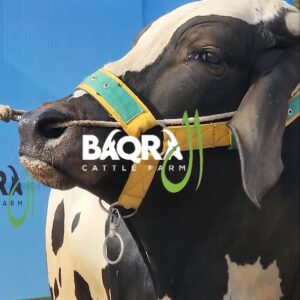ABOUT US
About Us
The idea for Al Baqra Cattle Farm was born from the vision of four brothers, combining expertise in global finance, tradition, and cattle farming. Two are qualified Chartered Accountants with careers spanning Big Four firms across the US, Middle East, and Canada, while the other two are on their path to becoming Chartered Accountants, bringing valuable experience in cattle farming. Their diverse backgrounds offer a unique perspective—some having witnessed the challenges Muslims face abroad in fulfilling Qurbani obligations, while others understand the complexities of cattle farming in Pakistan.


We live in a digital age, and solutions must evolve to match. Just as video calls and photos keep you close to loved ones back home, Al Baqra Cattle Farm ensures you stay connected to your chosen animal.
Whether it’s through pictures, videos, or live calls upon request, we bring you closer to your Qurbani experience, making it personal and heartfelt—because the love and bond with your sacrifice matter.
Understanding these challenges, the brothers envisioned a solution that aligns tradition with modern convenience. Thus, Al Baqra Cattle Farm was established—a remote farm in Pakistan offering affordable, high-quality cattle for Muslims worldwide.
Drawing inspiration from the global trend of offshore models in industries like accounting—where labor-friendly countries such as Pakistan, India, and Egypt offer cost-effective yet high-quality services—the farm brings Qurbani solutions to Muslims worldwide at significantly better rates. This ensures accessibility without compromising on quality or Islamic principles. At Al Baqra Cattle Farm, we provide

Transparency
Pictures, videos, and live calls on demand allow customers to view and select their cattle anytime
Convenience
Customers can purchase cattle early, avoiding the price hikes during Eid season. You can leave your cattle with us for care until Eid, paying manageable monthly upkeep costs instead of a lump sum.
Charity Options
After Qurbani, we can distribute the meat to deserving individuals on your behalf or deliver it anywhere in Pakistan.

Investment Opportunities
Purchase cattle, let us care for them, and sell them during Eid through our platform. We only charge a 5% fee, leaving the rest of the profit to you.
Combining financial expertise with a drive to innovate, Al Baqra Cattle Farm makes Qurbani more accessible, ethical, and affordable for Muslims worldwide.
Join us in redefining cattle farming with Al Baqra Cattle Farm—where faith meets modern solutions, and tradition blends seamlessly with technology.
Why do muslims do Qurbani?
The Story of Prophet Ibrahim (peace be upon him)
Qurbani commemorates the moment when Allah (SWT) tested Prophet Ibrahim’s (peace be upon him) faith by commanding him in a dream to sacrifice his beloved son, Prophet Ismail (peace be upon him). Despite the immense emotional challenge, Prophet Ibrahim (peace be upon him) submitted wholeheartedly to Allah’s (SWT) command, as did Prophet Ismail (peace be upon him), demonstrating their unwavering trust and devotion.
Just as Prophet Ibrahim (peace be upon him) prepared to sacrifice his son, Allah (SWT), in His infinite mercy, replaced Prophet Ismail (peace be upon him) with a ram, sparing his life. This event symbolizes the importance of submission to Allah’s (SWT) will and the readiness to part with what we hold dear for His sake.
The Significance of Qurbani in Islam
1.Obedience to Allah (SWT):
Qurbani is performed to emulate the obedience and devotion of Prophet Ibrahim (peace be upon him) to Allah (SWT). It is a way for Muslims to demonstrate their own submission and commitment to Allah (SWT).
2.Spiritual Reflection:
The act of sacrifice reminds Muslims of their duty to place Allah (SWT) above worldly attachments. It symbolizes the need to give up one’s ego, desires, and materialism for the sake of the Almighty
3.Charity and Community Spirit:
Qurbani teaches generosity and care for the less fortunate. The meat of the sacrificed animal is divided into three parts:
- One-third is kept for personal use.
- One-third is shared with relatives and friends.
- One-third is given to the poor and needy.
4.Strengthening Faith:
By performing Qurbani, Muslims strengthen their connection to Allah (SWT) and reflect on the lessons of submission and gratitude taught by Prophet Ibrahim (peace be upon him).
5.An Act of Worship:
For Muslims who can afford it, Qurbani is an act of worship prescribed by Allah (SWT) and encouraged by Prophet Muhammad (peace be upon him). The Prophet (peace be upon him) said:
“The son of Adam does not do any action on the Day of Sacrifice that is more beloved to Allah than the shedding of blood (sacrifice).” (Tirmidhi)
Conclusion
Qurbani is not merely a ritual; it is a profound expression of faith, gratitude, and community care. By sacrificing an animal, Muslims honor the legacy of Prophet Ibrahim (peace be upon him), reflect on their submission to Allah (SWT), and ensure that the blessings of Eid al-Adha are shared with those in need.
May Allah (SWT) accept our sacrifices and keep us steadfast in our faith. Ameen.
Your Sacrifice, Our Responsibility
sacrifice is carried out according to Islamic principles.
Who is Qurbani Farz Upon?
Qurbani is wajib (obligatory) upon Muslims who meet the following conditions:
1. Muslim:
The individual must be a Muslim.
2. Age of Maturity:
Qurbani is obligatory for those who have reached the age of puberty (baligh).
3. Financial Capability:
- The person must possess wealth or assets equivalent to or above the Nisab threshold.
- This is the same threshold that applies for Zakat, i.e., owning 7.5 tolas (87.48 grams) of gold, 52.5 tolas (612.36 grams) of silver, or their equivalent value in cash, property, or other assets.
The wealth should be surplus to their basic needs (housing, clothing, food, etc.).
4. Resident:
Qurbani is wajib on those who are not traveling (i.e., not a Musafir under Shariah). A Musafir is someone traveling 48 miles (77 km) or more and has not intended to stay in one place for more than 15 days.
When is Qurbani Performed?
Qurbani is performed during the specific days of Eid al-Adha.
1. Timeframe:
- From after the Eid Salah on the 10th of Dhul-Hijjah.
- Continues until sunset on the 12th of Dhul-Hijjah.
- Qurbani is performed during the specific days of Eid al-Adha.
2. Eid Salah Requirement:
Qurbani must be done after the Eid prayer. If done before, it is not considered valid.
Key Notes:
- Qurbani is not obligatory upon children, even if they are wealthy.
- It is not required for a dependent whose guardian or family head is already performing Qurbani on their behalf.
- Women meeting the Nisab criteria are equally obliged to perform Qurbani.
- May Allah (SWT) accept the sacrifices of all who fulfill this beautiful obligation.



